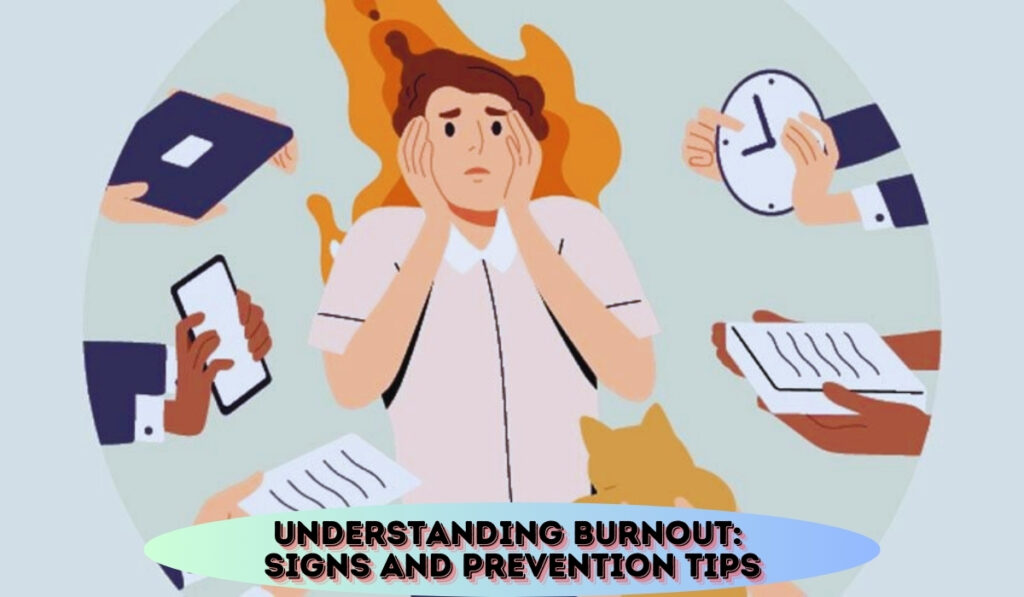Burnout Signs Understanding and Prevention Tips – 2024!

Understanding Burnout: Signs and Prevention Tips
In the present fast-paced workplace, burnout has become progressively pervasive. Recognizing the signs early and taking preventive measures is crucial for maintaining overall well-being.
The Rise of Workplace Stress
- Increasing Trends: Workplace stress has been on the rise, with record levels reported in recent years.
- Impact of Burnout: Prolonged stress can lead to burnout, affecting physical, mental, and cognitive health.
Identifying Burnout Symptoms
Burnout manifests differently in individuals, but there are common signs to watch out for:
- Insomnia: Difficulty sleeping due to racing thoughts or worry, impacting energy levels and mood.
- Physical Symptoms: Headaches, muscle tension, and other bodily discomforts due to prolonged stress.
- Emotional Detachment: Feeling disconnected or negative towards work and colleagues, affecting team dynamics.
- Reduced Cognitive Function: Brain fog, difficulty concentrating, and decreased productivity.
- Lack of Achievement: Feeling ineffective despite efforts, leading to frustration and demotivation.
- Social Withdrawal: Pulling away from social interactions and personal relationships.

Burnout Signs Understanding and Prevention Tips – 2024!
Preventive Strategies for Burnout
Taking proactive steps can help mitigate the risk of burnout:
- Establish Boundaries: Set clear boundaries between work and personal life to prevent overwork and stress accumulation.
- Communicate Needs: Communicate your needs for rest and recovery with managers and colleagues.
- Practice Self-Care: Incorporate mindfulness activities, exercise, and healthy eating habits into your daily routine.
- Seek Support: Reach out to friends, family, or professionals for emotional support and guidance.
Managing Burnout Effectively
- Early Intervention: Recognize the signs early and take action to prevent burnout from escalating.
- Professional Help: If burnout symptoms persist, consider seeking professional help to address underlying issues.
- Differentiating Burnout from Depression: Understand the distinction between burnout, which is work-related, and depression, which affects broader aspects of life.

Consequences of Ignoring Burnout – (Health Issues)
Ignoring burnout can lead to severe consequences:
- Job Performance Decline: Decreased productivity and poor job satisfaction.
- Health Implications: Physical symptoms, weakened immune system, and potential long-term health issues.
- Personal Relationships: Strains on personal relationships due to emotional withdrawal and stress.
- Mental Health Challenges: Increased vulnerability to anxiety, depression, and other mental health conditions.
Conclusion
Recognizing and addressing burnout is essential for maintaining a healthy work-life balance. By implementing preventive strategies and seeking support when needed, individuals can effectively manage stress and foster a more sustainable lifestyle.
Recognizing and addressing burnout is crucial for maintaining a healthy work-life balance and ensuring overall well-being. Burnout, characterized by chronic stress, exhaustion, and a sense of diminished accomplishment, can significantly impact both personal and professional life. Identifying the early signs of burnout—such as persistent fatigue, irritability, and reduced productivity—is the first step in tackling this issue effectively.
To manage and prevent burnout, implementing proactive strategies is key. This includes setting clear boundaries between work and personal time, prioritizing self-care, and engaging in activities that promote relaxation and rejuvenation. Regular breaks, physical exercise, and mindfulness practices can help mitigate stress and prevent burnout from escalating. Additionally, fostering open communication with employers and colleagues about workload and expectations can create a more supportive work environment.
Seeking support when needed is equally important. Accessing mental health resources, such as counseling or therapy, can provide valuable tools for coping with stress and developing resilience. Engaging in supportive networks, whether through professional organizations or social groups, can also offer a sense of community and shared understanding.
By incorporating these preventive measures and seeking support proactively, individuals can effectively manage stress and cultivate a more balanced, sustainable lifestyle. This approach not only enhances personal well-being but also contributes to a more productive and fulfilling professional life.
4o mini


